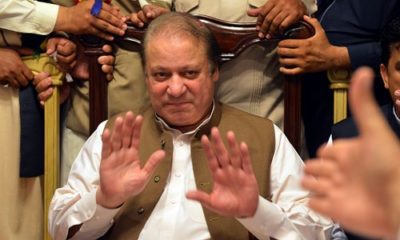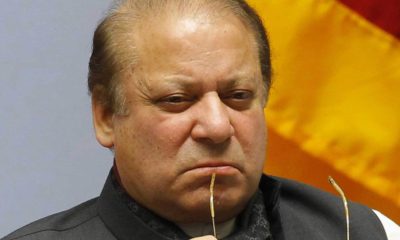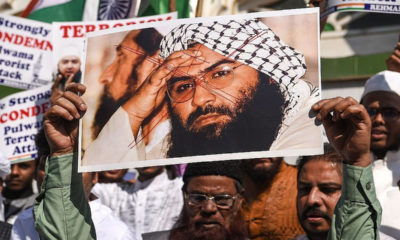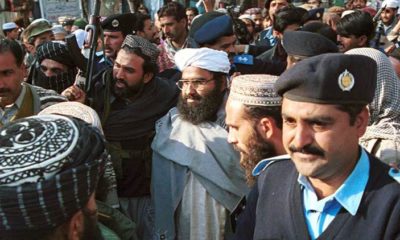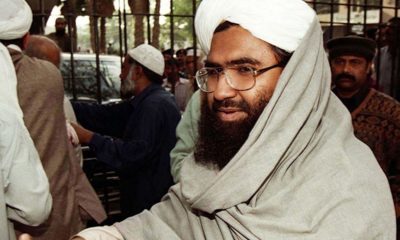Top News
Sharif admits isolation, tells military to act against terrorists
 Islamabad : Admitting to Pakistan’s diplomatic isolation, Prime Minister Nawaz Sharif has told the ISI to crack down on terrorists and soon conclude the probes into the 2008 Mumbai and 2016 Pathankot terror attacks.
Islamabad : Admitting to Pakistan’s diplomatic isolation, Prime Minister Nawaz Sharif has told the ISI to crack down on terrorists and soon conclude the probes into the 2008 Mumbai and 2016 Pathankot terror attacks.
Sharif’s blunt demand came at a high-level meeting of civilian officials with the Inter-Services Intelligence (ISI) chief, Gen. Rizwan Akhtar, the influential Dawn newspaper reported on Thursday, citing sources who were present.
In a stunning admission, Foreign Secretary Aizaz Chaudhry said on Wednesday that “Pakistan faces diplomatic isolation and that (its) talking points have been met with indifference in major world capitals”.
Even China, Pakistan’s closest ally, had questioned the logic of repeatedly putting on technical hold a UN ban on Jaish-i-Mohammad leader Masood Azhar, Chaudhry said, the Dawn reported.
The meeting — where there was an extraordinary verbal clash between the ISI chief and Punjab Chief Minister Shahbaz Sharif, the Prime Minister’s younger brother — came amid worsening ties with India.
Dawn said the civilian government, in a “blunt, orchestrated and unprecedented warning”, asked military-led intelligence agencies “not to interfere if law enforcement acts against militant groups that are banned or until now considered off-limits for civilian action”.
“Nawaz Sharif has directed that fresh attempts be made to conclude the Pathankot investigation and restart the stalled Mumbai attacks-related trials in a Rawalpindi anti-terrorism court,” the daily said.
It said the government informed the ISI of the “growing international isolation of Pakistan and sought consensus on several key actions by the state” to reverse the situation.
As a first step, the ISI chief and National Security Adviser Nasser Janjua have been told to travel to each of the four Pakistani provinces with a message for ISI’s sector commanders.
The first halt would be Lahore, capital of Punjab province, which borders India.
The Dawn said the decisions “appear to indicate a high-stakes new approach by the PML-N government” vis-a-vis the military-ISI and the terrorist groups.
Chaudhry said relations with the US had deteriorated and would likely further deteriorate because of the American demand that action be taken against the Haqqani network, which is active in Afghanistan.
India’s principal demands were the completion of the investigation into the terror attack on the IAF base at Pathankot in January 2016 and “some visible action” against the Jaish-i-Mohammad.
The Jaish has been blamed for the Pathankot attack that left seven security personnel dead and also the September 18 assault on an army camp in Jammu and Kashmir that killed 19 soldiers.
“To a hushed but surprised room, Chaudhry suggested that while China has reiterated its support for Pakistan, it too has indicated a preference for a change in course by Pakistan,” Dawn reported.
“The Foreign Secretary’s unexpectedly blunt conclusions triggered an astonishing and potentially ground-shifting exchange between the ISI chief and several civilian officials.”
Chaudhry underlined that the key international demands were for action against Masood Azhar and the Jaish as well as Hafiz Saeed and the Lashkar-e-Taiba, which attacked Mumbai, besides the Haqqani network.
Shahbaz Sharif complained to the ISI chief that whenever action had been taken against certain groups by civilian authorities, the security establishment had worked behind the scenes to set the arrested men free.
The Dawn quoted those at the meeting as saying that the Foreign Secretary’s comments and Shahbaz Sharif’s intervention were orchestrated by the Prime Minister to stir the military into action.
The ISI chief cautioned that action against terrorist groups now could be seen as “buckling to Indian pressure or abandoning the Kashmiri people”.
India carried out a surgical strike on the night of September 28-29 in Pakistani territory and killed an unspecified number of terrorists across the Line of Control (LoC). Pakistan denies this happened.
Entertainment
Casino Days Reveal Internal Data on Most Popular Smartphones

International online casino Casino Days has published a report sharing their internal data on what types and brands of devices are used to play on the platform by users from the South Asian region.
Such aggregate data analyses allow the operator to optimise their website for the brands and models of devices people are actually using.
The insights gained through the research also help Casino Days tailor their services based on the better understanding of their clients and their needs.
Desktops and Tablets Lose the Battle vs Mobile
The primary data samples analysed by Casino Days reveal that mobile connections dominate the market in South Asia and are responsible for a whopping 96.6% of gaming sessions, while computers and tablets have negligible shares of 2.9% and 0.5% respectively.
The authors of the study point out that historically, playing online casino was exclusively done on computers, and attribute thе major shift to mobile that has unfolded over time to the wide spread of cheaper smartphones and mobile data plans in South Asia.
“Some of the reasons behind this massive difference in device type are affordability, technical advantages, as well as cheaper and more obtainable internet plans for mobiles than those for computers,” the researchers comment.
Xiaomi and Vivo Outperform Samsung, Apple Way Down in Rankings
Chinese brands Xiaomi and Vivo were used by 21.9% and 20.79% of Casino Days players from South Asia respectively, and together with the positioned in third place with a 18.1% share South Korean brand Samsung dominate the market among real money gamers in the region.
Cupertino, California-based Apple is way down in seventh with a user share of just 2.29%, overshadowed by Chinese brands Realme (11.43%), OPPO (11.23%), and OnePlus (4.07%).
Huawei is at the very bottom of the chart with a tiny share just below the single percent mark, trailing behind mobile devices by Motorola, Google, and Infinix.
The data on actual phone usage provided by Casino Days, even though limited to the gaming parts of the population of South Asia, paints a different picture from global statistics on smartphone shipments by vendors.
Apple and Samsung have been sharing the worldwide lead for over a decade, while current regional leader Xiaomi secured their third position globally just a couple of years ago.
Striking Android Dominance among South Asian Real Money Gaming Communities
The shifted market share patterns of the world’s top smartphone brands in South Asia observed by the Casino Days research paper reveal a striking dominance of Android devices at the expense of iOS-powered phones.
On the global level, Android enjoys a comfortable lead with a sizable 68.79% share which grows to nearly 79% when we look at the whole continent of Asia. The data on South Asian real money gaming communities suggests that Android’s dominance grows even higher and is north of the 90% mark.
Among the major factors behind these figures, the authors of the study point to the relative affordability of and greater availability of Android devices in the region, especially when manufactured locally in countries like India and Vietnam.
“And, with influencers and tech reviews putting emphasis on Android devices, the choice of mobile phone brand and OS becomes easy; Android has a much wider range of products and caters to the Asian online casino market in ways that Apple can’t due to technical limitations,” the researchers add.
The far better integration achieved by Google Pay compared to its counterpart Apple Pay has also played a crucial role in shaping the existing smartphone market trends.
Content provided by Adverloom


